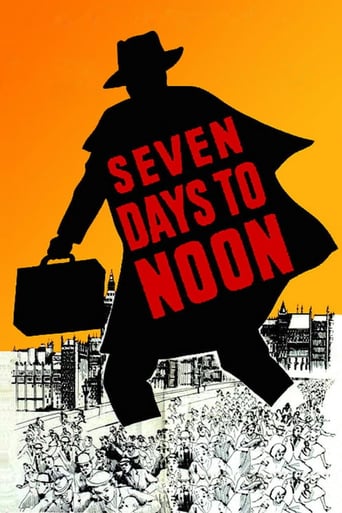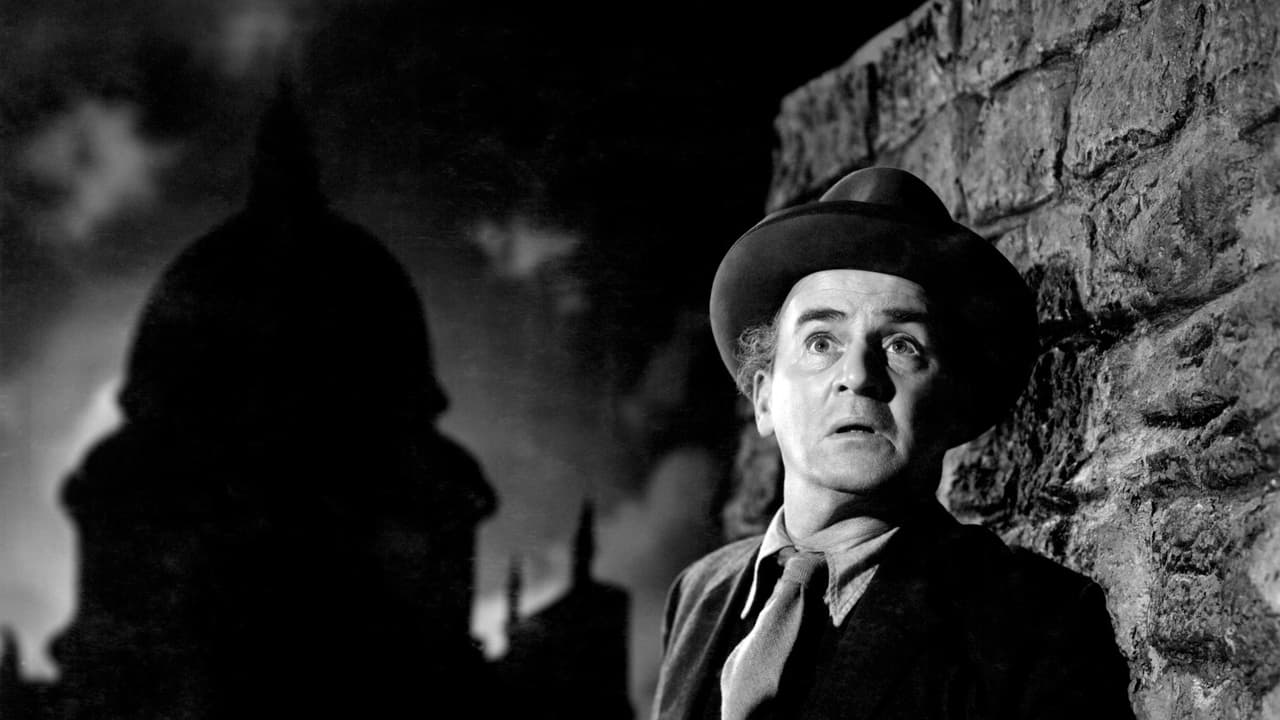SimonJack
More than one movie was made along the lines of this plot – a scientist decides to turn a deadly weapon against the government or society. I recall at least two others, and each of those lead characters had slightly different reasons. "Seven Days to Noon" may have been the first among the number of films of this nature. But, whether it is or not, this is one tremendous movie. The mystery and intrigue are not something that slowly must be unraveled in this film. They soon become clear. Rather, this movie is made to perfection in the way that it builds suspense and takes the audience along for the ride as Scotland Yard purses the culprit. Will they find Professor Willingdon in time? Will they be able to stop his destruction of a huge area of London radiating (no pun intended) out from the seat of government at Westminster Palace?The plot is superb and one can see why the film won the Oscar for best writing of a motion picture story. But the details of camera work, direction, shooting and other technical aspects are all superb in this film. The acting is top notch as well. The film also shows a well- ordered plan for evacuating London with a few days' notice. In true British stiff upper lip fashion, no one panics. One is tempted to imagine a similar film being made in Los Angeles that likely would show hordes of fleeing, screaming people. This is a very fine movie of suspense, human drama, and detailed police work. The script isn't filled with memorable lines, but I did catch one. Scotland Yard Superintendent Folland (Andre Morell) and the professor's assistant, Stephen Lane (Hugh Cross) are riding in a police car, talking about the professor. Folland says, "Repressing of fear is like trying to hold down the lid of a boiling kettle. Something's got to give eventually."The film also gives a look at some lesser-known but very good performers from early English filmdom. Olive Sloane is very good as Goldie. A younger Joan Hickson is very good as the chain-smoking, nervous landlady, Mrs. Peckett. Audiences everywhere would know her later for her portrayal in many films as Agatha Christie's Miss Marple. And, Ronald Adam plays the prime minister here – a type of role he filled in many of his later films and in TV series. This is a fine first-rate production that most people should enjoy.
dougdoepke
On first seeing this movie in the late 50's, one bomb in a guy's suitcase seemed mild since millions like me were facing full-scale nuclear war from the skies at any moment. At least this anguished soul (Jones) gives a week's warning. Now, of course, the baggage-check bomb looks suddenly prophetic and much scarier. One question to ponder is the logic behind the professor's threat. It's strictly utilitarian—better to lose a few million people than a few billion! After all, that same utilitarian calculus is typically used in wartime without controversy. Just how crazy, then, is this guy. Note that the screenplay avoids mention of this sort of irony or the question of its rationality.It's a tense film, but a curiously unemotional one, considering what's at stake. Perhaps it's the British tradition of stiff upper lip, or maybe the movie functions as an entertaining training film on how people should act during evacuation. But whatever the reason, no one gets very excited despite the apocalyptic threat. I suspect a Hollywood version would behave quite differently. At the same time, as someone who's never been to London, I enjoyed seeing the sights. And since many appear to be landmarks, likely the decades haven't changed much. Anyway, this has to be one of the few films on record to actually gain topicality after a 60- year passage and is well worth catching up with.(In passing— The 49th Man (1953) is the only Hollywood period film I know of dealing with the threat of a suitcase bomb. There, it's foreign agents smuggling A-bomb parts into US for later use. It might be helpful to point out that Soviet aviation was still a year away from a long-range delivery system.)
lorenellroy
This movie looks back and also forward -back in style and execution to the British wartime documentary tradition ,and forward in theme to the obsession amounting to unjustified paranoia about the nuclear arms race.Barry Jones -giving a brilliant and moving performance -plays a physicist driven to the point of mental collapse and moral crisis by his unease about his job ,which is working on developing nuclear weaponry at a top secret research laboratory.Gripped by a mood of apocalyptic religious fervour he steals the prototype of a new form of nuclear device ,small enough to fit into a briefcase and delivers an ultimatum to the British government (then as now in the invariably incompetent grasp of the Labour Party).They must destroy the nations' stockpile of nuclear arms within 7 days or else he will detonate the device and devastate London in the process.This is not a crazed scientist ,such as that jerk Oppenheimer,but rather a frail sick and tired old man operating from a number of the myriad boarding houses in the shabbier areas of London.the world is run down and has seen better days -like the man himself and his battered and worn bag.The movie is a race against time as the police hunt him down and London is readied for evacuation -scenes shot in a restrained and semi-documentary style . the movie has flaws -the young couple played by Hugh Cross (the scientists' assistant)and Sheila Manahan(the scientists'daughter)are pretty vapid and elicit weak performance .There is a moving cameo from Olive Jones as a fading actress on the verge of prostitution ,The movie is the best British contribution to the doomsday cycle of movies in the early 50's and is a striking piece of cinema that becomes at times almost unbearably tense
mail-2978
In this day and age when atomic weapons are everybody's bow and arrows the plot of this film has never been more up to date. The setting of the film in London with the devastation left by the bombing in World War II made a great back drop for the story. I can remember when London really looked like that. Both the plot and the characterisation are believable and the acting more than adequate. But star status must go to the people of London who back in 1950 still had the camaraderie and spirit forged by six years of war. This was a time when people still looked out for each other and this come over well as the story unfolds. With our video making mobile telephones and instant access to news this film may seem tame and dated but don't let the black and white format fool you this is a good story, well told and well worth seeing. Oh, and by the way, we really did talk like that back in 1950.


 AD
AD




